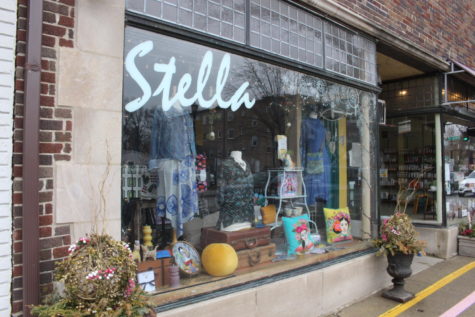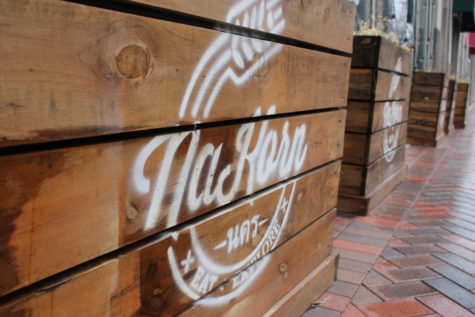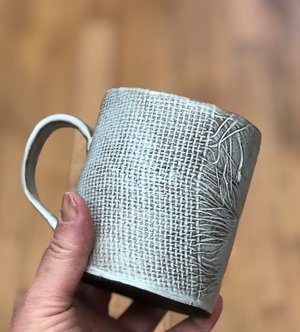Women’s History Month: female entrepreneurs break barriers
Female business owners across Evanston share stories of determination, commitment and community
March 15, 2023
With men systemically dominating many aspects of the workforce in the U.S., it is important to acknowledge the growth and representation of female business owners within our community. Since the month of March—Women’s History Month—is among us, the Evanstonian wanted to highlight some of the successful businesses in Evanston that are run by creative and determined women.
Stella Boutique: Rachel Hershinow

Located at 2116 Central Street lies the unique clothing and jewelry boutique, Stella. The store owner, Rachel Hershinow, shares the journey of the small business that has become a Central Street staple.
Stella—named after the popular song, Stella By Starlight—was originally opened by Gail Gilbert in 1998. Four years later when Gilbert was looking to sell the store, Hershinow walked in and saw an opportunity in the storefront.
“I was not planning on opening a store, but the opportunity presented itself. I happened to walk in at the right place and time and struck up a conversation with the owner who was looking to close the store,” Hershinow says. “It was one of those moments where you have this opportunity and you just go for it.”
In 2002, Hershinow stepped into her role as the sole owner of Stella.
Although she wasn’t able to choose the location of her business due to the spontaneous manner of ownership, Hershinow can not imagine being based anywhere else.
“I love Evanston. It’s a diverse and down-to-earth community [with] an urban and suburban appeal. There is really no suburb like Evanston.”
The nature of small business truly relies on the connections made with those in the community.
“I always feel that I’m like a women’s salon or a meeting place for people. It’s not just about merchandise. I just feel like I’m really part of the community on Central Street. I’m friends with the owners of the small businesses on the street and I’m friends with people in the community. I think that it’s important to have small businesses in your neighborhood. You really become connected [to the community] in a greater sense than just a store,” Hershinow shares.
The tight-knit is also what has guided this business through difficult times. The financial hardship that came with the COVID pandemic specifically hurt small businesses, causing many to shut down. Stella was able to adapt and maintain these connections to not only keep the store running, but also create an escape for many customers during this unprecedented time.
“I was in shock for a while and then realized that I [simply] have to keep the storefront alive. I just started to be creative and think outside of the box.”
Hershinow began to sell masks and sanitary products that benefitted both her business and the customers alike. Productively—while the shop was closed to in person shopping—Hershinow established Stella TV, video segments posted on Stella’s social media platforms showing its merchandise. These video clips provided a new form of togetherness for the Stella community and allowed customers to offer their own input regarding which items were adored and what new things they hoped to see. Hershinow went above and beyond, hand delivering these products to ensure that customers still felt linked to the boutique they know and love.
Hershinow was not alone in this unique struggle.
“I’ve seen a lot of businesses close [which] has not [been] easy, but I’m really grateful for my longevity,” Hershinow shares.
Boutiques themselves each have a distinct aura that are established by the people working there and the merchandise being sold, which is what Hershinow admires so much about her career.
“I love going to New York shows and buying for the store, but also the people that I have met through this. It all just kind of connects into one perfect thing,” she says.
Each day spent in the boutique is constantly filled with different things depending on the customers’ wants and needs.
“You never know who’s gonna walk in the door,” Hershinow explains. “Looking for clothing, looking for a gift, just wanting to browse. Some people just kind of want to do their own thing. Some people need some help with things. [Regardless] of the day, it’s always a friendly atmosphere.”
There is also the unseen work with pricing, shipments and unpacking boxes, steaming, hanging on racks and presenting the clothing and accessories in the front mirror to attract customers. Even through all of this, the passion for running this business continues within Hershinow.
“I am still totally passionate about what I do. I’m lucky and I don’t take it for granted,” she says. “I just want to keep doing it until I can’t move anymore.”
NaKorn Urban Thai: Mina Sudsaard and Sam Rattanopas

Walking into NaKorn Urban Thai, locals are met with fantastical lights paired with familiar wooden floors and furniture that contribute to the upscale fine-dining look, with the food just to match.
Mina Susaard and Sam Rattanopas had their grand opening of NaKorn on Nov. 4, 2016 and introduced Evanston to a unique form of the Thai dining experience.
“I think we bring something new. Not because Thai food is different, but we bring something from our heart and something that we grew up eating,” Rattanopas explains.
NaKorn means “metropolitan” or “big city” in Thai, which is a way they tied their heritage and upbringing to the restaurant.
“It was really hard to find a name that had a story and meaning behind it. We both originally came from Bangkok, which is a big capital city. Bangkok in Thai has the word NaKorn actually in it, so it was [important] to find something that we have in common,” Susaard explains.
Their similar upbringing is connected to the food they serve as well.
“Even though it’s like very authentic Thai–something that we grew up eating–it’s not streetfood,” Rattanopas says. “We dress it up; it’s more like city food. So that’s why the word NaKorn is perfect for what type of Thai food we serve, as well as representing both of us.”
Being in the restaurant business for over a decade, Rattanopas was inspired to create a unique establishment, which became NaKorn.
“I wanted to open a pretty restaurant with good food. You can come in and have a complete meal that represents us. I wanted to own a restaurant [where] locals can say, ‘Oh, I don’t know what to eat. Let’s go in here,’” Rattanopas explains.
The perfect gourmet dining experience that encompasses all the stages of a Thai meal; the entrees, service, drinks, and even the conversations are meant to add to the experience and environment that Sudsaard and Rattanopas strive to maintain.
“Eight years ago,” Sudsaard says, “the food scene kind of changed a little bit in Evanston.
“There was Boltwood and Farmhouse, so we [said], ‘Hey, maybe let’s take a look at Evanston.’ Also, I live here, so we decided to take a look.”
Although it may seem like simple planning and decorating, the restaurant business is much more, and there are constant hardships that change the landscape every single day.
“The first two years were the hardest for me, because once we opened, we had nothing left,” Rattanopas says. “Our backs [were] against the wall. Every two weeks, I checked, prayed, cried, and hoped that we [would] have enough money to pay the staff and pay for everything. So that was hard.”
Even as the restaurant found its footing, there were broader cultural trends in the restaurant industry that affected Sudsaard and Rattanopas.
“There are studies on the consumer cancel culture in these different industries with the loss of potential revenue,” Sudsaard explains. “Almost $2 billion a year because of [last-minute cancellations] because of things like no shows. If you make a reservation at 6:30, we cannot seat anyone that walks in for an hour and then we lose that table.”
Entrepreneurial struggles are rough to get through, especially at places like NaKorn that are family run and don’t rely on big money investors, but Sudsaard and Rattanopas have found the love within the community to keep their restaurant up and running.
“I think Evanston is a very good town support-wise. A lot of people donate, and we use that money to cook for the community. We cook for homeless shelters [and] we cook, deliver and grocery shop for those who are unable. We cook and deliver from 100 to 700 portions every other day,” Rattanopas explains.“You can feel the love from a lot of people.”
Found on Orrington Ave. in the heart of Downtown Evanston, the NaKorn staff brings the flavor and feeling of authentic Thai cuisine that Sudsaard and Rattanopas want everyone to experience.
Ware Ceramic Studio: Joanna Kramer and Julia Finlayson

Four years ago, the inventive environment of Ware Ceramic Studio came to life, welding and giving space for two businesses—Joanna Kramer Ceramics and Julia Finlayson’s Grandmont Street—to thrive and grow. The two women came together to share this space and do what they love.
Highlighting Joanna Kramer—who owns and operates Joanna Kramer Ceramics—we gain insight into the journey of her entrepreneurial experience.
Kramer has a background in social work but also a degree in art therapy, so throughout her life, she has always worked in the arts, whether that was creating stained glass, quilting, or making ceramics, which currently defines her company.
“The first studio that I rented, I just did a one-year lease, because I wasn’t sure if it was going to work out. But I thought, ‘Okay, a year, it’s not gonna be a huge financial strain,’ and then it just kept rolling.”
For Kramer, being based in Evanston just made sense. Her family and friends live here, which is what initially helped the success of her business.
“I live here and know a lot of people here, so those were my first customers and [the] first people that took my classes and bought my work. We’re all friends, so it just made sense,” Kramer explains.
Kramer, being in an artistic career, is constantly doing what she is passionate about.
“I’m always in some rotation of either making, trimming, firing, or glazing.”
There are many ways that Kramer has found herself connecting to the larger Evanston community, whether that is through hosting concerts at the studio, collaborating with other artists, or the classes that she teaches.
“I teach one night workshops where people can come in [and participate]. There’s always a project and I demonstrate the project and teach them how to make it. We’ve done everything from charcuterie platters and cheese boards, vases and berry bowls, mostly functional [products]. I also teach an after school kids class for middle schoolers,” Kramer shares.
These workshops are not only a fun outing for adults, they also inspire younger generations, allowing them to tap into their artistic spirits.
During COVID, the transition impacted Kramer’s business differently than most; she was able to continue offering creative experiences, but remotely.
“I’m one of these weird stories where my business was impacted in a really positive way,” Kramer tells. “I started teaching online, and I think people were just so desperate to do something. It just kind of worked on Zoom, because you didn’t have to talk. I described it as like a Bob Ross thing, where I’m just talking to them about the project. So it worked through the pandemic.”
Staying connected to the community during this time was an obvious success for Kramer; her audience even reached students at the University of Chicago, where freshmen were offered courses where they could engage with her curriculum and instruction.
Kramer also provides a space for people to come together that share a love for artistic creation.
“I think it provides a space where someone is kind of like them. I’m a mom of kids that go to school here [in Evanston], and I really am a maker,” Kramer tells. She also uses her store as an outlet to join other artists together. “I think that one of the things I love to do is collaborate and find ways to have ceramics and even my studio, connect with other artists.”
Inside the inviting storefront on the corner of Greenleaf Street and Wesley Avenue is a world of passion found in every clay masterpiece created by the diligent and spirited women that own and run these businesses.
From Central Street, to Downtown Evanston, to the west side, these strong entrepreneurial women are working to have their businesses thrive. One thing they have said in common when giving advice to those who will follow in these fields: “Follow what you love to do, and just take the next step.” Kramer tells. Hershinow shares, “you have to have a sense of who you are…if you have that understanding, that trust your gut. Have the confidence and realize that you’re sometimes going to make poor decisions, but then you learn from it.” And finally, agreeing, Rattanopas concludes “sometimes things don’t come easy, but you have to stick with it. If you love what you do, and you are proud, you will be successful.”









